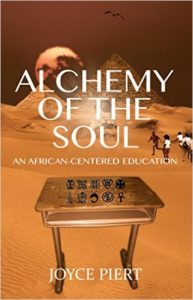By Robert R. Thomas
“Alchemy of the Soul: An African-Centered Education,” the title of the final Tendaji Talk of the current series, is also the title of a 2015 book by Joyce Piert. Dr. P, as she is affectionately called, was the evening’s principal speaker.
Donna Ullrich, representing Neighborhoods Without Borders, sponsors of the Tendaji Talks, prefaced her introduction by announcing that that a new series of talks is very much in the works.

Joyce Piert discussed and read from her book at the last of the current season of Tendaji Talks.
Piert opened her remarks to 25 attendees in the basement of Flint Public Library by giving her bonafides: Flintoid, educator, electrician with GM, a return to education, teaching in various environments, training teachers, running a couple of businesses and currently teaching in the mathematics department of UM-Flint.
Piert is the CEO and founder of the I AM Institute for Learning (IAMIL) and holds a doctorate from Michigan State University in K-12 educational administration.
In describing the evolution of her life and career, Piert said described a powerful catalyzing moment: “It all started with a dream.”
She presented the dream by reading the opening pages of her book. The dream involved a joyous awe at being a teacher responsible for protecting and educating young charges in a hike through a very busy urban area. But the dream turned to a nightmare when her brood was caught in the crosswalk by a traffic signal change.
“Disruption ignited,” she read, “I found myself in slow-motion, observing the chaotic scene of little bodies soaring through the air as if they had grown wings like the little angels that they were. Fear and pain congealed in one huge lump in my throat choking out my own voice. I closed my eyes as if removing that scene from my eyes would allow me to erase it from my reality. But surprisingly, it appeared to work. The noise stopped abruptly, instant silence filled my ears. I opened my eyes. I had been dreaming.”
For Piert, despite her professional qualifications as a teacher, the meaning of the dream was clear. “You are not ready yet,” she interpreted. “You will hurt the children.”
The uncertainty of deconstructing that dream led Piert to focus her life on education. Specifically, she wanted to start a school, one that would not hurt the children.
“I was looking for the optimum education for African-Americans,” she said. She investigated Afro-centric scholars and African-centered curriculums.
Her school, she said, would feature an African-centered educational model, “an education that provides students of African descent with an education that deconstructs the hegemonic influences of this society. Society promotes a positive concept and acknowledges African cultural heritage and cultural reclamation for all the shareholders.”
Piert pointed out that if you are teaching a Euro-centered curriculum, you are not recognizing the African-centered historical continuum and cultural dynamics, this despite the fact that “we are all from Africa as a cultural people,” she said. “This is about us, all of us.”
The African-centered educational model, she continued, “is established on the concept of African nation building, spirituality and African cultural traditions. It is centered in the African world-view systems….. It is about how the African people see themselves in relationship to the universe, in relationship to others. How they see themselves in relationship to spirituality. An African-centered curriculum is one that refers to life experiences, history and traditions of African people as the center of analysis.”
“So,” said Piert, “I did the research. I found out what an African-centered school was, and I found one—there were several down in Detroit—they no longer exist today, but they existed when I did the research.” Piert found a well-established African-centered school, 40 years as an independent black institution, in which to do her research, what she termed an evaluative experience of an African-centered curriculum and pedagogy.
She interviewed seven African-American students who were educated within and graduated from an African-centered curriculum from K-12 and 2-12, all of whom went on to college. Her basic question was, What did they think of their educational experience?
They shouted their replies: Affirmation. Positive self-esteem. Cultural proficiency. Expectation for greatness. Cultivate African cultural knowledge. Higher order of thinking. As one of the students said, “I am not going to college to figure out who I am; I know who I am.”
“African culture believes that the children belong to the community,” said Piert. “In African cosmology, children are blessed and they are ancestors coming back. Children are very purposed. The village is responsible for the children,” she said. “So family and community is believed to be the very core of a nation. You can’t have a nation without family and community.”
Nevertheless, when they applied to become a charter school, founders of the school Piert studied opened themselves up to the mandates of the state and federal governments, mandates, she said, which inherently favored the Euro-centric curriculum and cultural values of the dominant culture of Euro-centric white privilege. The school withered and died under such restrictions.
As for Piert, “I utilized the African-American experience as the core paradigm for human liberation and a high level of human functioning….It assists African-American students in the self-conscious act of creating history.”
She concluded her presentation with “I want you to think about educational experiences.” To facilitate such thinking she offered these questions, and the evening concluded with audience members braining storming many answers.
What do you believe is the purpose of education and what should be the purpose of children in the 21st century?
Would you consider the African-centered model or something like it as a viable model for the 21st century?
If you could create an educational model that would be optimal for all children today, what would it look like?
Piert’s book is available on Amazon or from the publisher, Peter Lang Inc, peterlang.com.
EVM reporter-at-large Robert R. Thomas can be reached at captzero@sbcglobal.net.


You must be logged in to post a comment.